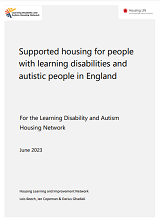Supported housing for people with learning disabilities and autistic people in England

This report, 'A lifeline for Lifetime Independence', written by the Housing LIN and commissioned by the Learning Disability and Autism Housing Network, provides the most up to date information on the size, scope, cost, support and importantly future needs of supported housing in England for individuals with a learning disability and autistic people.
The Network aimed to provide an evidence base that could be used to inform and influence future government policy in relation to accommodation and supported housing, including supported housing classified as 'except accommodation, for people with a learning disability and autistic people.
Through the analysis of existing evidence and by undertaking primary research, some key findings revealed:
- between 35,000 to 37,500 people with a learning disability and autism currently live in supported housing.
- it is estimated that there will be shortfall of c27,000 to c34,500 units of supported housing by 2037, or around c1,800 to c2,200 units per annum.
- Supported housing plays an increasingly critical role in enabling people with a learning disability and autistic people to live independently at the heart of their communities.
- 23% of this population live in mainstream housing with a care/support package, 15% are living in residential/ nursing care settings, and 37% live with family and friends is 37%.
- at least c.80% of supported housing for people with learning disabilities/autistic people in England is provided by Registered Providers of social housing.
- 83% of all supported housing for people with learning disabilities and autistic people is categorised in relation to housing benefit regulations as specified accommodation, either as exempt accommodation (44%) or managed properties (56%).
- The average weekly rent and service charge for supported housing for people with learning disabilities/autistic people is c.£250 per week for self-contained housing and c.£235 for shared housing.
The report's findings provide recommendations under strategic planning, housing and support funding, capital funding, and oversight and regulation. These will be of particular interest to policy makers, commissioners, providers, developers of and investors in supported housing in England.
Ian Copeman, Business Director at Housing LIN, said:
“We are delighted to have worked with the LDAHN to undertake this research into the scale, scope and cost of supported housing for people with learning disabilities and autistic people. We regularly work with local authorities, NHS organisations and housing providers to widen the housing options available to people with learning disabilities and autistic people. We look forward to the work of the LDAHN and their partners leading to more people having their own home.”
